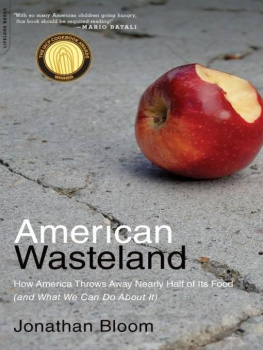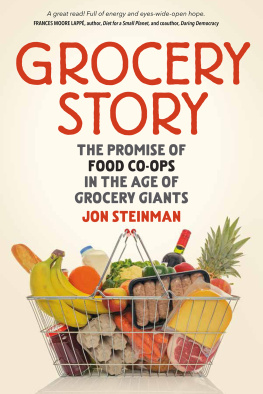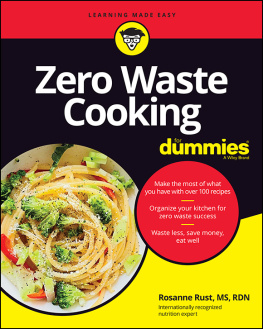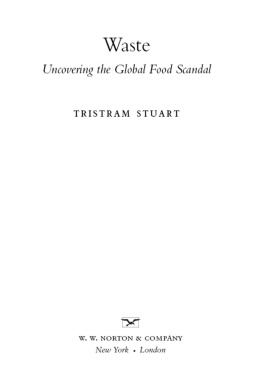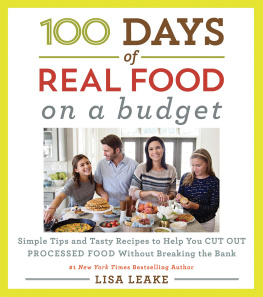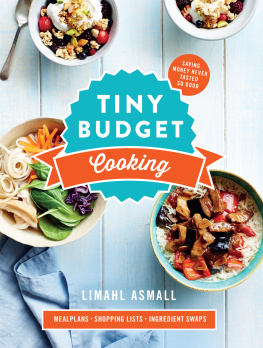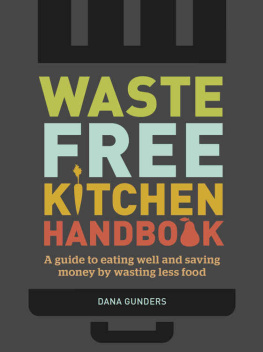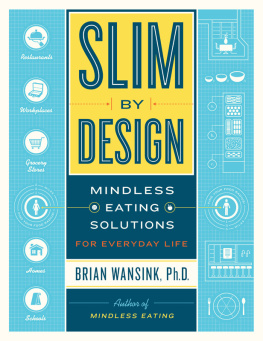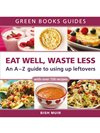Table of Contents
PRAISE FOR AMERICAN WASTELAND :
[A] terrific introduction to our countrys food system through the lens of what gets lost and tossed as food moves from farm to truck to retailer to table. We all canand shouldplay our part in preventing food waste, and Jonathan Bloom has loads of useful ideas about how individuals, businesses, and governments can cut down on waste at every step in the food chain.
Marion Nestle, author of Food Politics and What to Eat
Journalist Bloom documents some specifics about the nature of wasted food in the twenty-first century and calls into question both the economic efficiency and the morality of such profligacy. Bloom has found some hopeful signs that this trend may be waning.
Booklist
Bloom gives us the trash stats, but he also helps come up with everyday solutions you can put into action today.
Daily Green
Blooms book is a fascinating look at how the food industry and we its customers waste food. Thankfully, it is also a guide to ending that waste.
San Francisco Book Review
Combining first-rate reporting, keen insight, and lively prose, Jonathan Bloom has taken whats hidden and put it in plain sight. The message not only has universal resonance but, even better, it offers pragmatic solutions. Anyone who eats will be shocked, chastened, and driven to reform. A superb achievement.
James E. McWilliams, author of Just Food
From seed to cultivation to processing to retail, ending waste has been the justification for industrializing the food chain from seed to table. American Wasteland blows this myth, and shows that an industrialized, commodified, corporatized food system is a system for creating waste, and a system for creating hunger.
Dr. Vandana Shiva, author of Stolen Harvest and Soil, Not Oil
Carefully considering the impact of food waste on the planet and the poor, [Bloom] makes a lively and convincing case for reformfrom farm to fork and back again.
Elizabeth Royte, author of Garbage Land and Bottlemania
Bloom has gone where few have dared to treadright into the waste bins of kitchens, restaurants, grocery stores, and farms. It would be maddening if Bloom didnt also tell us what to do about it, but thankfully he does. This book should not to be wasted.
Samuel Fromartz, author of Organic, Inc .
From farm to table, Bloom susses out where good food falls in between the cracks, and serves up suggestions for what we can do to lower our collective waste print. Put this at the top of your to-do list.
Kim ODonnel, author of The Meat Lovers Meatless Cookbook
Wake up and smell the landfill! Who knew a book about edible garbage could be so entertaining? If were serious about fixing food in this country, Blooms masterful investigation has got to be one of our starting points.
Anna Lapp, author of Diet for a Hot Planet
As much about the food we eat as it is about the food we discard, American Wasteland draws our attention to a culture of excess and wastefulness and the threats that this cultural mindset poses economically, environmentally and ethically. Bloom challenges us to open our eyes and engage ourselves in an issue that we can not ignore.
Josh Viertel, President, Slow Food USA
Jonathan Blooms fact-filled book is an important wake-up call and prod to action.
Joel Berg, Executive Director, New York City Coalition Against Hunger,
author of All You Can Eat , and former USDA Coordinator
of Food Recovery and Gleaning
Bloom does a thorough job identifying places in the food chain where food is wastedfood that could feed the hungry instead. American Wasteland is an excellent read for anyone who wants to know how surplus and scarcity can exist in the same country or in the same city.
Jilly Stephens, Executive Director of City Harvest
TO EMILY,
without whom this book would not exist
and the sun would not rise.
TO BRUCE,
without whom this book would have been finished sooner,
but for whom I count my lucky stars.
INTRODUCTION
A forsaken orange sits in a Raleigh, North Carolina, parking lot.
PHOTO BY JONATHAN BLOOM
Every day, America wastes enough food to fill the Rose Bowl. Yes, that Rose Bowlthe 90,000-seat football stadium in Pasadena, California. Of course, thats if we had an inclination to truck the nations excess food to California for a memorable but messy publicity stunt.
As a nation, we grow and raise more than 590 billion pounds of food each year. Even using the more conservative figure would mean that 160 billion pounds of food are squandered annuallymore than enough, that is, to fill the Rose Bowl to the brim. With the high-end estimate, the Rose Bowl would almost be filled twice over.
If those numbers dont hit home, consider that the average American creates almost 5 pounds of trash per day.
How we reached the point where most people waste more than their body weightor at least the average American body-weighteach year in food is a complicated tale. In short, Americans gradual shift from a rural, farming life to an urban, nonagricultural one removed us from the sources of our food. Our once iron-clad guarantee of inheriting generations of food wisdom became less so, as busier lives forced many of us to leave the kitchen or spend less time there. Convenience began to trump homemade, and eating out drew level with dining in. We have higher standards for our meals, but diminished knowledge about how to maximize our use of food. Many of us dont even trust our noses to judge when an item has gone bad. Yet, our awareness of pathogens has multiplied, and we apply safety rules to food with the same zealous caution that we apply to allergies, kids walking to school, and most everything in modern life.
Certainly, some food loss is unavoidable. For example, there are many potential pitfalls, such as harsh weather, disease, and insects invading farmers fields, that are outside of our control. And then theres storage loss, spoilage, and mechanical malfunctions. I classify all of the above factors as loss, not waste (also omitted when I use the term waste are inedible discards like peels, scraps, pits, and bones). Broadly speaking, I consider food wasted when an edible item goes unconsumed as a result of human action or inaction. There is culpability in waste. Whether its from an individuals choice, a business mistake, or a government policy, most food waste stems from decisions made somewhere from farm to fork. A grower doesnt harvest a field in response to a crops lowered price. Grocers throw away imperfect produce to satisfy their (and, as consumers, our) obsession with freshness. We allow groceries to rot in our refrigerators while we eat out, and when at restaurants we order 1,500-calorie entres only to leave them half eaten.
Were not going to revert to an agrarian society anytime soon, but that doesnt mean we cant have a greater appreciation of our food. While completely eliminating food waste may be impossible, reducing it isnt. Improvements are needed at all steps of the food chain, but most importantly at the part that involves us. Buying wisely, and maximizing our food use once its in our possession, would go a long way toward minimizing that daily Rose Bowlsized pile of waste.

